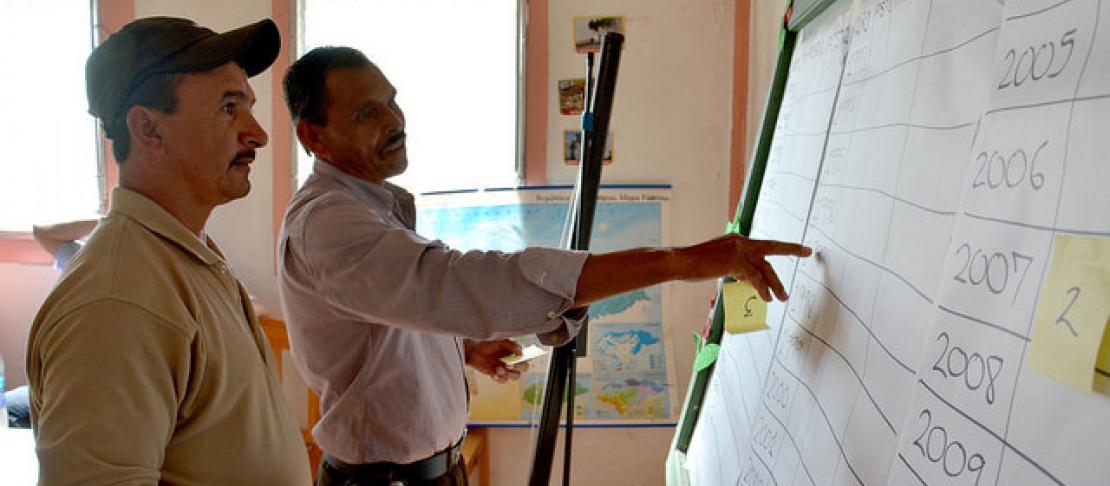Agroclimatic information: a commitment to innovate and increase food security

With growing concern about climate change, the consolidation and proper use of climate information has become necessary to incorporate into the policies and strategies of developing countries.
The increasing use of unsustainable technologies and practices places particular vulnerability to nature, where the entire biosphere of the planet is exposed to irreparable damage. From this comes the essential task of protecting both our lives and our ecosystem.
The German philosopher, Hans Jonas, in his book 'the Philosophy of Nature, and the Ethics of Responsibility' makes it imperative that we must act in such a way that "The effects of your actions are compatible with the permanence of an authentic human life," or also in the opposite way: "Do not endanger the indefinite continuity of humanity on Earth."
Consequently with that thought, and to achieve that our life in this world is compatible with our environment, it is necessary that our actions conform to the laws of nature, and ultimately build a socio-natural agreement with it. In this context, there are many countries, local communities and civil institutions that take on the challenge of understanding their environment.
In Honduras we intend to look towards the future, and we are visualizing the need to generate adequate information to intervene within the agri-food sector.
With growing concern about climate change and its implications for the sustainability of life on the planet, it has become necessary to build qualified and appropriate use of climate information, with the aim of incorporating it in the policies and strategies of especially those in the developing world, whose most vulnerable populations are mostly smallholder farmers, and due to lack of information are subject to making decisions to meet their basic needs based almost on The total uncertainty.
To reverse this situation, it is important that nations provide an agro-climatic information platform, understood as a basic project to advance solutions within the agri-food sector. In Honduras we intend to look towards the future, and we are visualizing the need to generate adequate information to intervene within the agri-food sector, highly vulnerable to the shocks of climate change and variability.
For the same reason, it is questionable if Honduras is able to assume, in the agroclimatic context, the challenge of generating a unified platform for the development, treatment and adequate delivery of agro-meteorological information, taking into account the evident progress made so far, in the methodologies of quality control and in the implementation of processes to ensure good records.

Colombia had a successful experience implementing Local Technical Agroclimatic Committees.
For the Colombian agro-climatologist Francisco Boshell, to unify this information, it is necessary to establish an Agroclimatic Information Platform for the Agri-Food Sector of Honduras, coordinated and led by the Ministry of Agriculture and Livestock (SAG), which will allow the unification and homogenization of all available information, and to propose the establishment of Participative Systems of Early Agroclimatic Alerts (SPAAT) for the collection and provision of data that smallholder farmers require, on a local scale.
In this context it makes sense to propose, within the framework of operating the Platform, the implementation of the Local Technical Agroclimatic Committees (LTACs), which in Colombia are a great success. This innovative initiative intends to integrate stakeholders of the agricultural sector at the local level to inform the producers about the expected changes in the climate of their region, and thus to make better decisions for their crops.
Undoubtedly, the LTACs help farmers to make decisions, such as moving the planting date by one or two weeks, depending on the crop and climatic conditions, in order to make the soil more suitable, and the crop can receive the amount of water and solar radiation it requires. This improves the chances that the crop has outstanding yield, or at least reduce losses that can be avoided.
Climate-smart agriculture (CSA) practices are also an essential part of LTAC services, so it is expected that the practices will be integrated by key partners at the local level: government authorities, academics, producers' asociations, research centers, etc., delivering information and fostering farmers to implement CSA practices.

Each agricultural region of a LTAC has its particularities that are taken into account when formulating the recommendations, in order to make them more meaningful for farmers.
These committees also provide opportunities for discussion among key stakeholders for the development of local agro-climatic information in order to identify best practices for climate adaptation. To strengthen this linkage, it is important for LTACs to produce a bulletin, or other pedagogical output, to transfer this information to local technicians and farmers. This instrument offers, among other things, seasonal predictions and climatic forecasts analyzed at the committee, along with CSA practices according to the type of crop.
It is necessary to apply a quality control system to this information to ensure that it is optimal and risk can be avoided, since it is clear that local farmers are the most valuable users, and we must respond to them without delay and detours. This means the periodic maintenance of the meteorological stations to the verification in the field of the information provided by the observations of bioindicators, vegetables, animals and physics, of the local climate, combining them with ancestral knowledge and science.
The demands of implementing these information platforms may be 'utopian' or too ambitious for some people, however, those utopias with which we dream allow us to tie values and purposes, fostering our development as a society and a nation. Many utopias are on the way and others have been replaced over the years, but their lack of realization does not detract from them; utopias actually drive us to carry out projects beyond the capabilities we thought we had.
Walter Rodezno worked as Research and Technology Specialist at the Climate Change Unit of the Ministry of Agriculture and Livestock (SAG) of Honduras.



